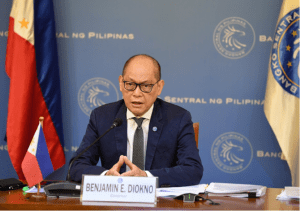Business and Economy
Ease of paying taxes bill to support Diokno’s digitalization push

FILE: Governor Benjamin E. Diokno represented the Bangko Sentral ng Pilipinas (BSP) at the 6th ASEAN Finance Ministers’ and Central Bank Governors’ Meeting and Related Meetings, including the ASEAN Central Bank Governors’ Meeting and the Dialogue with Business Councils (i.e., ASEAN Business Advisory Council, EU-ASEAN Business Council, and US-ASEAN Business Council), held via videoconference on 2 October 2020. (Photo: Bangko Sentral ng Pilipinas/Facebook)
MANILA – The Ease of Paying Taxes (EOPT) bill will enable incoming Finance Secretary Benjamin Diokno pursue his digitalization and modernization priorities for the tax agencies, a House leader said on Monday.
In a statement, House Ways and Means Committee chair Joey Salceda said the EOPT is aligned with Diokno’s priority of digitalization of the taxpaying process, as it proposes to delete various provisions in the Tax Code that require taxes to be paid in the Bureau of Internal Revenue offices or banks within the jurisdiction of the taxpayer’s legal residence, principal place of business or principal office, thereby giving taxpayers payment flexibility.
“The EOPT has provisions that will remove the legal barriers to digitalizing every stage of the tax process. That very closely aligns with Secretary Diokno’s agenda for the BIR and BOC,” he said.
He said the measure will help Diokno modernize the “labyrinthine” tax administration procedures by simplifying tax compliance, removing redundant and obsolete tax requirements, and lifting restrictions that prevent taxpayers from complying with tax laws remotely.
“We can do much in Congress, but we also need the motive force of the Department of Finance on fiscal reforms. So, I hope Secretary Diokno will prioritize pushing for the Ease of Paying Taxes Act. I guarantee that the House of Representatives almost certainly will approve it again next time. The incoming Speaker Romualdez was keen on that bill as Majority Leader. But the Senate often acts on fiscal reforms only when there is executive support,” he said.
Salceda noted that some of the largest foreign and domestic business groups have called on Senate to pass the EOPT bill, which has already been approved by the House of Representatives, in a letter dated May 18, 2022.
The letter was signed by the American Chamber of Commerce of the Philippines, Australian-New Zealand Chamber of Commerce of the Philippines, Bankers Association of the Philippines, Canadian Chamber of Commerce of the Philippines, European Chamber of Commerce of the Philippines, Financial Executives Institute of the Philippines, IT and Business Process Association of the Philippines, Makati Business Club, and Management Association of the Philippines, among others.
He said ease of paying taxes is the most important ease of doing business proposal pending in Congress.
“You need a pro-taxpayer tax reform before we can enact other tax measures that will result in higher taxes or higher compliance. You want people to find it easy to pay taxes first before you collect more taxes. That’s why EOPT is crucial,” Salceda said.
The Ease of Paying Taxes Act proposes to amend the National Internal Revenue Code as amended by introducing administrative reforms that will simplify tax compliance and strengthen taxpayer rights.
The proposal gives the Bureau of Internal Revenue the power to create taxpayer classifications depending on the capacity to comply with tax rules and regulations; amount and type of tax paid; gross sales and/or receipts as well as inflation; volume of business, wage and employment levels; and similar economic and financial factors.
EOPT also calls for the implementation of simplified tax rules and regulations for ease of compliance.
To simplify value added tax (VAT) administration, he said the EOPT seeks to eliminate the distinction between the documentation and basis of sales as against services subject to VAT.
“At present, sales subject to VAT should be evidenced by invoices while services subject to VAT should be covered by official receipts. EOPT makes the basis and documentation uniform to just be VAT invoices,” he said.
EOPT also proposes to add a provision that the PHP3-million VAT threshold, which was increased by the TRAIN law, may be adjusted to its present value not later than Jan. 31, 2021 and every three years after based on the consumer price index published by the Philippine Statistics Authority.
“This would allow small businesses to grow without worrying about having to register for VAT if they are still unable to,” Salceda said.
EOPT also proposes to allow the payment of the taxes before they are due. This impliedly allows payment of tax not necessarily simultaneously with the filing of the return.





















